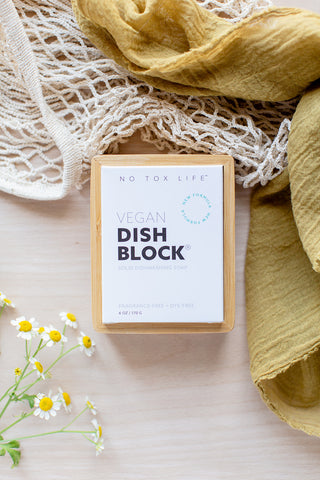Guide to a Plastic Free Kitchen
When helping others move towards a “less waste” lifestyle, I always encourage them to pick one area of their house to begin with.
The kitchen is a great place to start.
From food storage to dishwashing, plastic can creep its way into every little corner of your kitchen. It can feel hard to escape, but don't fear! By making small changes one item at a time, you'll find yourself cooking in the sustainable kitchen of your dreams in no time.
I have slowly replaced my plastic products with more sustainable alternatives over the years. This has resulted in me not only reducing my plastic waste but has also saved me a considerable amount of money.

Let's begin at the kitchen sink.
Are you familiar with those green and yellow kitchen sponges? What about plastic dish brushes? And... That plastic bottle of dish soap that permanently resides next to your sink. (Until it runs out of course, and you replace it with another one.)
Your typical kitchen sponge is made from polyurethane, an oil-based plastic that is NOT recyclable. And, every time you use it, it releases tiny microplastics that overwhelm our waterways. Those microplastics then end up back in the food we eat, and the water we drink.
Did you know that we consume an average of 5 grams of plastic a week?! That's equivalent to eating an entire credit card, every week.
YIKES.
When your current kitchen sponge wears out, I have some awesome plastic-free alternatives for you to try out!
My favorite are these Biodegradable Eco- Sponges. This is the closest swap I have found to a traditional sponge. When you originally wet them, they puff up to the thickness of your typical kitchen sponge. But, they’re 100% plant-based and compostable. They lather up dishes great, without sending vast amounts of plastic into our waterways. They are super easy to disinfect, simply microwave your wet sponge for 20 seconds. Each sponge lasts 1-3 months, but I have found that if you sanitize them frequently, they last much longer!
Please compost them at the end of their life!
For tougher dishwashing, I love this Dish and Vegetable Brush. It’s tough on food but gentle on the environment.
It’s made from teakwood and agave, and completely compostable at the end of its life. This is perfect for replacing those plastic pot scrubbers.

When you finish up that bottle of Dawn dish soap, I encourage you to give this Plastic-Free Dishwashing Block a try. This block is a game-changer! Solid dish soap replaces the need for plastic bottles, and they last for so long! I keep it on a soap dish next to my kitchen sink, and just rub my sponge or dish brush on it, then wash as usual! Just note, the bristled dish brush does wear it down a bit faster than the sponge or a washcloth. This soap is biodegradable, septic, and greywater safe. Its ingredients are better for our planet, and your hands!
Solid dish soap isn't your cup of tea? No problem! We have a refillable liquid dish soap option available as well!
Now that we have dishwashing covered, let's move on to food storage.
I know that everyone has “that drawer” in their kitchen.
The one piled high with mismatching Tupperware containers and their eternally lost lids. This is your reminder to go clean that out.
Do NOT throw away still functioning plastic containers! Keep the ones that still have some life left, but re-purpose, or properly recycle ones that are broken or missing lids.
Your Tupperware, while yes, plastic, probably still has some life left in it. Reuse it until you can’t anymore.
But, if you’re in need of some better food storage options, check out these stainless steel bento boxes!
I love packing my lunch in these. Long gone are the days of salads leaking in my bag. The steel and silicone gasket design on these ensure that they are leak and plastic free.
These are great for packing lunches, but most of the food in my fridge is stored in old glass jars that I've saved and repurposed. I have saved every jar from every jam, salsa, and spaghetti sauce I have ever bought. I just wash them out, soak them, and rub off the labels! Glass is super durable, and won't absorb stains or smells like plastic does.
If you’re just storing leftovers, I’d recommend the oldest trick in the book, a plate over the top of your bowl/plate of leftovers.
People did, in fact, live before plastic wrap and tin foil.
However, if you're looking to invest in a more reliable way to cover your food, I would recommend beeswax wraps.
They replace plastic wrap and are 100% compostable. They're made from organic cotton, beeswax, and jojoba oil. You simply use the heat from your hands to mold the wrap around the plate or bowl, and voila!
Now, your beloved ziploc bags.
They’ve gotta go.
I use these reusable zip top bags by Stasher every day!

They are silicone, so much more durable than the flimsy plastic, and they last forever!
They are super simple to wash out and reuse.
Imagine what you could do with all of the money you save by never buying a single box of Ziploc bags again.. Amazing.
As I have mentioned time and time again. Sustainable living is not an all or nothing.
By making small changes, we can make a big difference. As you run out of one plastic product and need to replace it, purchase a sustainable alternative.
It may feel slow, but before you know it your kitchen will be plastic-free.
Thank you for taking steps towards a greener future!
xo,
Jackie
